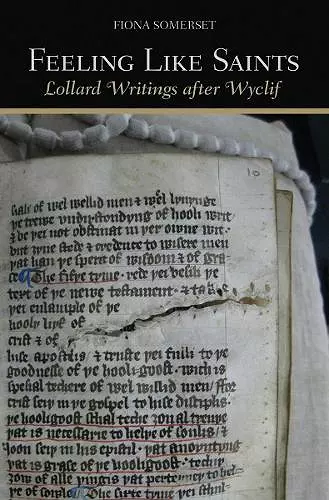Feeling Like Saints
Lollard Writings after Wyclif
Format:Hardback
Publisher:Cornell University Press
Published:8th May '14
Currently unavailable, and unfortunately no date known when it will be back

"Lollard" is the name given to followers of John Wyclif, the English dissident theologian who was dismissed from Oxford University in 1381 for his arguments regarding the eucharist. A forceful and influential critic of the ecclesiastical status quo in the late fourteenth century, Wyclif’s thought was condemned at the Council of Constance in 1415. While lollardy has attracted much attention in recent years, much of what we think we know about this English religious movement is based on records of heresy trials and anti-lollard chroniclers. In Feeling Like Saints, Fiona Somerset demonstrates that this approach has limitations. A better basis is the five hundred or so manuscript books from the period (1375–1530) containing materials translated, composed, or adapted by lollard writers themselves.
These writings provide rich evidence for how lollard writers collaborated with one another and with their readers to produce a distinctive religious identity based around structures of feeling. Lollards wanted to feel like saints. From Wyclif they drew an extraordinarily rigorous ethic of mutual responsibility that disregarded both social status and personal risk. They recalled their commitment to this ethic by reading narratives of physical suffering and vindication, metaphorically martyring themselves by inviting scorn for their zeal, and enclosing themselves in the virtues rather than the religious cloister. Yet in many ways they were not that different from their contemporaries, especially those with similar impulses to exceptional holiness.
Feeling Like Saints, [Fiona] Somerset's magnum opus on Lollard literature, displays her extensive knowledge of the subject and models a new approach to the literature that will be influential for a long time to come.... Feeling Like Saints is a pioneering book in Lollard studies and in the larger field of vernacular English literature. The vitality of any scholarly field depends upon the ability of its practitioners to find new objects, ask new questions, and develop new skills of analysis. Feeling Like Saints does all these things and more.
-- Emily Steiner * Modern Philology *Sumerset presents her case in assured style, but is far from dogmatic, instead setting out her contentions in order to engage in a dialogue with her readers and inviting their responses. Her book is thus both stimulating and enjoyable and will doubtless lead to further lively and productive debate. It should therefore be read not just by those interested specifically in the lollards, or in heresy, but by any scholar seeking to understand the wider complexities and interactions between later medieval religious ideologies and practices.
-- Katherine J. Lewis * Review of English Studies *Written accessibly with verve and forthrightness, Feeling Like Saints is an important book that paints a distinctive picture of Lollard culture and textuality. Somerset's intelligentand weighty treatment of her corpus of texts gives richness and subtlety to this picture, and in doing so provides a wealth of material and issues for future investigation.
-- Ian Johnson * Speculum *Somerset's project thinks through the feelings lollard writers cultivated in order to compose themselves and their audiences. Unlike Bale, her argument focuses on the specifically textual rendering of a particular religious subjectivity....And, while lollard writers are not unique in their suggestion that a proper ordering of the emotions in accordance with a rational disposition of the will amounts to virtue, Somerset is masterful at showing how the feelings that lollard writers taught their audiences promoted a virtuous form of love that held this religious community together
-- Holly A. Crocker, University of South Carolina * Exemplar- Winner of Winner, Margaret Wade Labarge Prize (Canadian Soci.
ISBN: 9780801452819
Dimensions: 235mm x 155mm x 25mm
Weight: 907g
336 pages